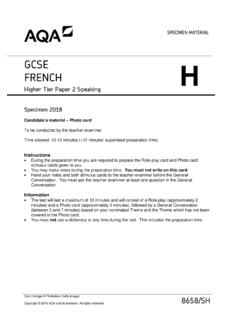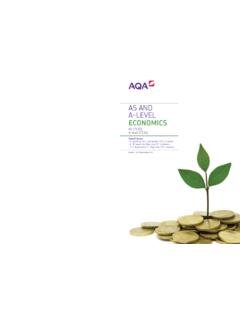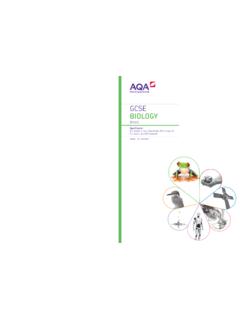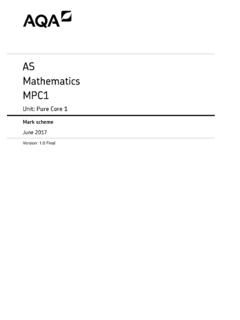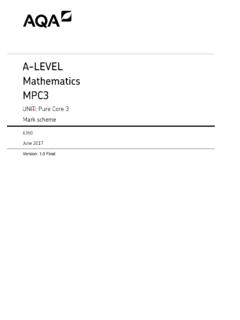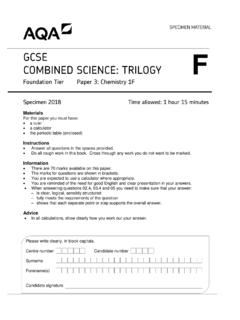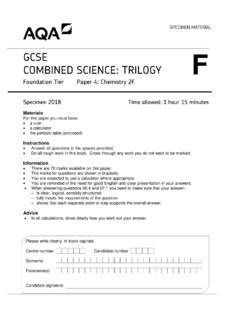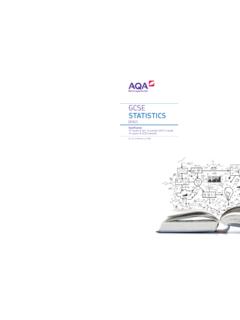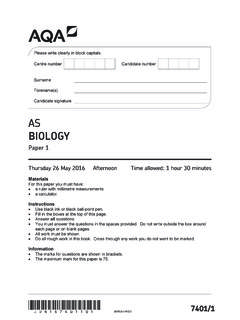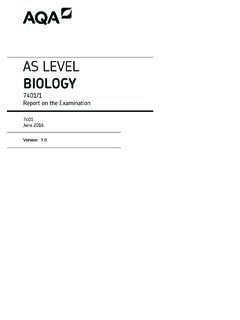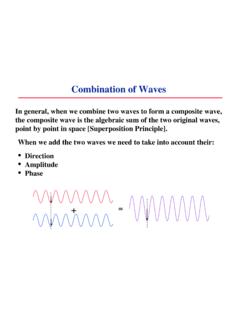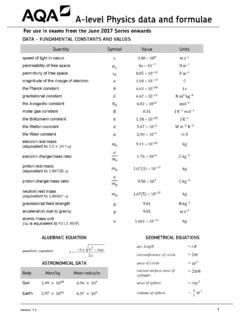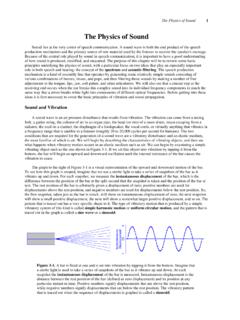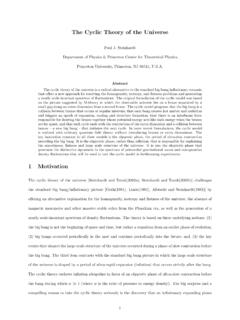Transcription of Get help and support GCSE PHYSICS - AQA
1 GCSEPHYSICS(8463)SpecificationFor teaching from September 2016 onwardsFor exams in 2018 onwardsVersion 21 April 2016 Copyright 2016 AQA and its licensors. All rights retains the copyright on all its publications, including the specifications. However, schools and colleges registered with AQA are permitted to copy material from this specification for their own internal Education (AQA) is a registered charity (number 1073334) and a company limited by guarantee registered in England and Wales (company number 3644723). Our registered address is AQA, Devas Street, Manchester M15 help and supportVisit our website for information, guidance, support and resources at can talk directly to the science subject teamE: 01483 477 756 3 GCSE PHYSICS (8463).
2 For exams 2018 onwards. Version for the most up-to-date specification, resources, support and administrationContents1 Introduction Why choose AQA for GCSE PHYSICS support and resources to help you teach 62 Specification at a glance Subject content Assessments 83 Working scientifically 94 Subject content Energy Electricity Particle model of matter Atomic structure Forces waves Magnetism and electromagnetism Space PHYSICS ( PHYSICS only) Key ideas 745 Scheme of assessment Aims and learning outcomes Assessment objectives Assessment weightings 776 General administration Entries and codes Overlaps with other qualifications Awarding grades and reporting results Re-sits and shelf life Previous learning and prerequisites Access to assessment: diversity and inclusion Working with AQA for the first time Private candidates 807 Mathematical requirements 818 Practical assessment Use of apparatus and techniques Required practical activities 854 Visit for the most up-to-date specification, resources, support and administrationAre you using the latest version of this specification?
3 You will always find the most up-to-date version of this specification on our website at We will write to you if there are significant changes to this Appendix A: PHYSICS equations 965 GCSE PHYSICS (8463). For exams 2018 onwards. Version for the most up-to-date specification, resources, support and administration1 Why choose AQA for GCSE PhysicsOur philosophy: science for allWe believe that science has something to offer every student. That s why we have a suite of science qualifications for Key Stage 4 to suit students of all abilities and all ll see that our GCSE PHYSICS , along with Chemistry and Biology, is a clear straightforward specification, with clear straightforward exams, so all your students can realise their specification has been developed with teachersWe ve involved over a thousand teachers in developing our specification, exams and resources.
4 So you can be confident that our GCSE PHYSICS is relevant and interesting to teach and to learn. We ve ensured that: the subject content is presented clearly, in a logical teaching order. We ve also given teaching guidance and signposted opportunities for skills development throughout the specification. the subject content and required practicals in our GCSE Combined Science: Trilogy are also in our GCSE Biology, Chemistry and PHYSICS . So you have the flexibility to co-teach or to move your students between courses. all our science qualifications provide opportunities for progression. Our GCSE PHYSICS includes progression in the subject content and consistency in the exam questions, so that your students have the best preparation for practicals have been trialled by teachersThere s no better way to learn about science than through purposeful practical activities as part of day to day teaching and learning.
5 Our eight required practicals: are clearly laid out in the specification, so you know exactly what s required are deliberately open, so you can teach in the way that suits you and your students have already been trialled in ll find even more support and guidance in our practical handbook, which includes recommendations and advice from teachers in the exams, so students can give straightforward answersWe ve improved our question papers. You ll find that our exams: use more straightforward language and fewer words so they re easier to understand have fewer contexts so students don t get confused have questions that increase in difficulty so students feel confident have been written with our GCSE Mathematics and A-level science teams, so students have consistency between content and 3,000 students have sat our specimen question papers and they agree that they re clearer and more straightforward than for the most up-to-date specification, resources, support and administrationWe don t profit from education you doWe are an educational charity focused on the needs of teachers and students.
6 This means that we spend our income on improving the quality of our specifications, exams, resources and can find out all about our Science qualifications at support and resources to help you teachWe ve worked with experienced teachers to provide you with a range of resources that will help you confidently plan, teach and prepare for resourcesVisit to see all our teaching resources. They include: additional practice papers to help students prepare for exams schemes of work, written by experienced teachers a practical handbook, including recommendations and advice from teachers who ve trialled our practicals AQA approved textbooks reviewed by experienced senior examiners subject expertise courses for all teachers, from newly qualified teachers who are just getting started to experienced teachers looking for fresh for examsVisit for everything you need to prepare for our exams, including: past papers, mark schemes and examiners reports specimen papers and mark schemes for new courses Exampro.
7 A searchable bank of past AQA exam questions exemplar student answers with examiner your students results with Enhanced Results Analysis (ERA)Find out which questions were the most challenging, how the results compare to previous years and where your students need to improve. ERA, our free online results analysis tool, will help you see where to focus your teaching. Register at information about results, including maintaining standards over time, grade boundaries and our post-results services, visit your skills up-to-date with professional developmentWherever you are in your career, there s always something new to learn. As well as subject-specific training, we offer a range of courses to help boost your skills.
8 Improve your teaching skills in areas including differentiation, teaching literacy and meeting Ofsted requirements. Prepare for a new role with our leadership and management can attend a course at venues around the country, in your school or online whatever suits your needs and availability. Find out more at PHYSICS (8463). For exams 2018 onwards. Version for the most up-to-date specification, resources, support and administrationHelp and support availableVisit our website for information, guidance, support and resources at you d like us to share news and information about this qualification, sign up for emails and updates at , you can call or email our subject team : 01483 477 7568 Visit for the most up-to-date specification, resources, support and administration2 Specification at a glanceThis qualification is linear.
9 Linear means that students will sit all their exams at the end of the Subject content1 Energy (page 16)2 Electricity (page 22)3 Particle model of matter (page 32)4 Atomic structure (page 36)5 Forces (page 43)6 waves (page 58)7 Magnetism and electromagnetism (page 66)8 Space PHYSICS ( PHYSICS only) (page 71)9 Key ideas (page 74) AssessmentsPaper 1:What s assessedTopics 1 4: Energy; Electricity; Particle model of matter; and Atomic it s assessed Written exam: 1 hour 45 minutes Foundation and Higher Tier 100 marks 50 % of GCSEQ uestionsMultiple choice, structured, closed short answer and open response. Paper 2:What s assessedTopics 5 8: Forces; waves ; Magnetism and electromagnetism; and Space in Paper 2 may draw on an understanding of energy changes and transfers due to heating, mechanical and electrical work and the concept of energy conservation from Energy and it s assessed Written exam: 1 hour 45 minutes Foundation and Higher Tier 100 marks 50 % of GCSEQ uestionsMultiple choice, structured, closed short answer and open response.
10 +9 GCSE PHYSICS (8463). For exams 2018 onwards. Version for the most up-to-date specification, resources, support and administration3 Working scientificallyScience is a set of ideas about the material world. We have included all the parts of what good science is at GCSE level: whether it be investigating, observing, experimenting or testing out ideas and thinking about them. The way scientific ideas flow through the specification will support you in building a deep understanding of science with your students. We know this will involve talking about, reading and writing about science plus the actual doing, as well as representing science in its many forms both mathematically and visually through specification encourages the development of knowledge and understanding in science through opportunities for working scientifically.
